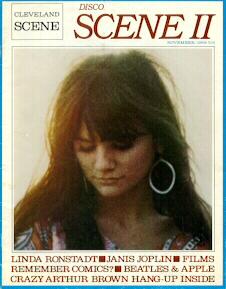 Linda Ronstadt is beautiful. She is also articulate, gracious, and a
singer of overwhelming power. While success has come upon her swiftly,
and she is still sorting out her impressions, there's no doubt about
the impression she makes on audiences. Under her dark brunette bangs
flash the eyes of the gypsy girl we'd all like to run away with.
But in the middle of that round moon face is a nose that crinkles
when she laughs, telling you she's really somebody's kid sister from
down the block.
Linda Ronstadt is beautiful. She is also articulate, gracious, and a
singer of overwhelming power. While success has come upon her swiftly,
and she is still sorting out her impressions, there's no doubt about
the impression she makes on audiences. Under her dark brunette bangs
flash the eyes of the gypsy girl we'd all like to run away with.
But in the middle of that round moon face is a nose that crinkles
when she laughs, telling you she's really somebody's kid sister from
down the block.
In performance she commits herself totally, something that just cannot be felt on recordings. Each number in the set builds until, in a finale of evangelical proportions, she sings Bob Dylan's "I Shall Be Released." It ends the set because nothing could possible follow it. She calls it the first hymn that Dylan ever wrote. The description fits. And, like Linda herself, the song resonates with the joy and pain of the people we meet in life who are lucky enough to be real.
Let's start with some of the things that influenced you and brought you, musically speaking, to the point where you are now. Well, geographically I'm from the Southwest. . . Tuscon, Arizona to be specific. My family has a musical background... my father plays the guitar. There's a lot of country music in the clubs and on the radio there, and I got to hear a lot of Mexican music... the ranchero music, which is like Mexican bluegrass... my favorite singer is a Mexican woman named Lora Belle Turan . . . it's very exciting, romantic music. Where did the name Stone Poneys come from? It's from an old blues recording, called "Stone Poney Blues," by Charlie Patton.
Edith Piaf, who was a great French cabaret singer, and Billie Holiday, probably the greatest blues singer of all. I think Janis Joplin is one of the greatest blues singers around right now. Like Billie, she has great phrasing. And Bob Dylan is such a beautiful performer ... his phrasing is unbelievable... he's such a real person too... you just know from his songs that he knows what suffering means. . . "Blonde On Blonde" was about the height of his being up tight with himself, but instead of getting destroyed he turned around, did "John Wesley Harding" which is so full of spiritual things ... it's honest because he commits himself ... and for an artist of that calibre, with that much power to commit himself, well, he's committing a huge percentage of the world too, because they will follow him ... that album was such a gentle trend setter in just that way. . . "I Shall Be Released" is about my favorite song right now ... I learned it from The Band on the "Big Pink" album, which is the band Dylan has been using at his concerts ... I like Jerry Lee Lewis, too ... I'm doing one of his songs from his new country album, "Break My Mind." And Randy Newman ... his songs are so beautiful and he hurts so much ... I just want to send him a big jar of aspirin ... Johnny Cash's "Folsom Prison" album was so beautiful it made me cry ... it's so real to hear him up there singing that song to those prisoners ...
Tim used to live in a house that I lived in too, and we both used to move in and out ... that is, we stayed there alternately. It was the house he wrote about in "Morning Glory," which I call "The Hobo." That was the "fleeting house." There's a lot of country influence in your repertory now. That's partly because of my Southwestern background... but the pop music scene was freaked out for so long... and now it's like it's coming home again... country music is very real and groovy... and it's exerting so much influence on pop that even the Beatles' "Revolution" has a country sound to it... I learned a lot from Kitty Wells and other country singers... and you can't get any better than Hank Williams... he's still an important part of the country music scene, and you can hear his influence in Bob Dylan's last album. "I'll Be Your Baby Tonight" is going to be on our next album. It's my other favorite song right now.
I believe in astrological things, and reincarnation, that people who get hung up sooner or later have to turn around and wade through all that wrong stuff they've done, if not in this life then in the next one, and after they pay their dues then they should be ok... because there's always another chance... What it's all about is trying your best... I sometimes get things like hay fever if I'm not working well, and I think stuff like that comes from just not trying your hardest, because if you're doing your thing it doesn't matter how hard you're working, you just feel good about it... That's why this is a dangerous business... you get up there and expose yourself, and if people don't like you it really hurts... when you're really hurting like that there's no cop-out... you can't put the audience down and say they don't know from art... you just have to be honest and say well, I didn't do very well that time...
Well, that kind of criticism, which usually comes from smug little magazines, is pure, intellectual bull... musicians don't really worry about anything like that... the important thing in musicianship is how much you communicate... it can be either Procol Harum or Hank Williams... it doesn't matter... once you get over the sublime line... there are plenty of super-technicians around but they don't really communicate... the Beatles have a line in "Nowhere Man" which says "just like you and me" which is a real kind of honesty... and Bob Dylan's most powerful line is "let us not speak falsely now, the hour is growing late" and it's true... the only way to get straight is to tell the truth... that's the only way. |
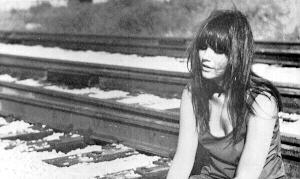 |
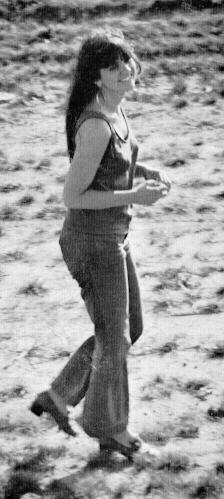 Her band is not the original Stone Poneys, but a new group of young professionals
she has gathered together, and they are a joy to watch. They really get on it
in working with each other. There's John Forsha, guitar; John Ware, drummer;
John Keski, bass; Herb Steiner, steel guitar; Bill Martin, piano. Steiner is a Jewish
pixie and Martin is the wit of the group, combining Peter Sellers zaniness with an Orson
Welles touch for the dramatic.
Her band is not the original Stone Poneys, but a new group of young professionals
she has gathered together, and they are a joy to watch. They really get on it
in working with each other. There's John Forsha, guitar; John Ware, drummer;
John Keski, bass; Herb Steiner, steel guitar; Bill Martin, piano. Steiner is a Jewish
pixie and Martin is the wit of the group, combining Peter Sellers zaniness with an Orson
Welles touch for the dramatic.
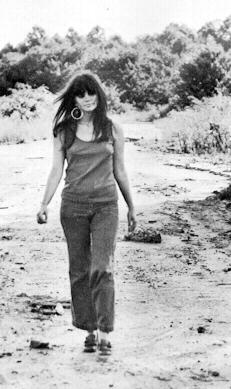 Where else do you find your material, or what other performers do you admire?
Where else do you find your material, or what other performers do you admire?
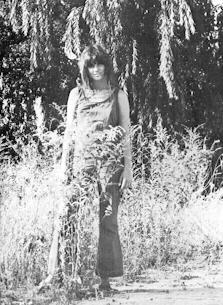 You've done quite a few of Tim Buckley's songs, too.
You've done quite a few of Tim Buckley's songs, too.
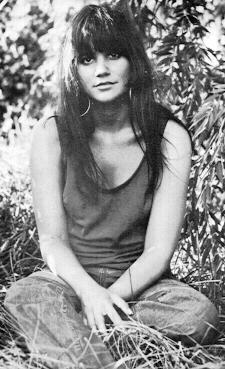 What's your philosophy?
What's your philosophy?
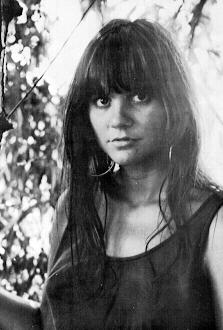 Have you had much criticism now that you're working with a folk-rock band, as opposed to a
pair of folk guitarists?
Have you had much criticism now that you're working with a folk-rock band, as opposed to a
pair of folk guitarists?